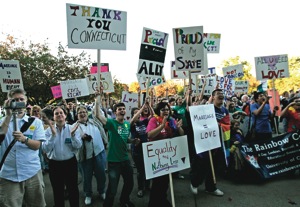-
- Court makes Conn. third state to allow same-sex marriage
- Same-sex marriage ban attracts big money in California
- Mormons recruit out-of-state for same-sex marriage ban
- 10 years after Shepard, no federal hate crime law
- U.S. gay candidates expect Election Day breakthrough
- Ark. plans to drop unmarried foster parent ban
- National News Briefs
- World News Briefs
national
Court makes Conn. third state to allow same-sex marriage
Governor says ruling doesn’t reflect the majority of state’s residents
Published Thursday, 16-Oct-2008 in issue 1086
HARTFORD, Conn. (AP) – The idea civil unions could be a satisfying but less contentious substitute to same-sex marriage was knocked down Friday by Connecticut’s Supreme Court.
There is no substitute, the justices ruled 4-3 as they made the state the nation’s third to allow same-sex weddings.
The ruling might not have been as earthshaking as the one in Massachusetts that allowed same-sex marriage for the first time in the U.S., or the one in California that made it legal on the other side of the country and in the nation’s most populous state. But it cut into the view that there is some solid middle ground on an issue that has inflamed passions on both sides.
“It’s another court saying that separate but equal is not OK,” said Edward Stein, a professor at the Cardozo School of Law in New York City. “As state courts start to say this … gradually, over time, there might be a consensus that emerges.”
Same-sex weddings are expected to begin in Connecticut in less than a month. Out-of-staters will be eligible, but few other states are likely to recognize the unions.
The vast majority of states ban same-sex marriage, but some have passed laws that recognize same-sex unions in some way. The civil unions approved by Connecticut’s General Assembly in 2005 are identical to marriages in virtually every respect except the name.
Connecticut opponents of same-sex marriage fought against the civil unions law but were even more outraged by Friday’s ruling, the first in which civil unions were rejected as an alternative.
“Even the legislature, as liberal as ours, decided that marriage is between a man and a woman,” said Peter Wolfgang, executive director of the Family Institute of Connecticut. “This is about our right to govern ourselves. It is bigger than gay marriage.”
Californians will vote next month on a ballot measure that would reinstate that state’s same-sex marriage ban, but Connecticut’s governor and attorney general said there is little chance of a similar challenge to Friday’s ruling.
“The Supreme Court has spoken,” said Gov. M. Jodi Rell, a Republican who opposes same-sex marriage. “I do not believe their voice reflects the majority of the people of Connecticut. However, I am also firmly convinced that attempts to reverse this decision – either legislatively or by amending the state Constitution – will not meet with success.”
Evan Wolfson, head of the group Freedom to Marry, said people watching Connecticut will come to realize that legalizing same-sex marriage will not harm anyone.
“Couples in Canada, California, Massachusetts, South Africa and Spain are all doing better; they’re happy, they’re celebrating,” he said, referring to the nations and states where same-sex couples can marry. “Meanwhile, the gays didn’t use up all the marriage licenses. There is still plenty of marriage to share.”
The ruling was thrilling for the plaintiffs, eight couples who sued in 2004 after they tried to get wedding licenses. Gay and lesbian couples celebrated the ruling first with a rally on the steps of the Capitol and then a party at a downtown Hartford hotel.
Some, like lead plaintiffs Elizabeth Kerrigan and Jody Mock of West Hartford, began planning their weddings.
“So, wow. Surreal, very surreal; that’s just what I’m feeling right now,” Mock said. “I’m just ecstatic. It’s such a relief, the joy of it.”
“We’ve always dreamed of being married,” said Janet Peck of Colchester, who sued with her partner, Carole Conklin. “Even though we were lesbians and didn’t know if that would ever come true, we always dreamed of it.”
The plaintiffs declined to drop their lawsuit when Connecticut approved civil unions, saying they wanted full marriage rights. At the time, no other state had granted so many rights to same-sex couples without being ordered to do so by a court.
In the majority opinion, Supreme Court Justice Richard N. Palmer wrote that denying marriage to same-sex couples would create separate standards.
“Interpreting our state constitutional provisions in accordance with firmly established equal protection principles leads inevitably to the conclusion that gay persons are entitled to marry the otherwise qualified same sex partner of their choice,” Palmer wrote.
Three justices issued separate dissenting opinions.
Justice Peter T. Zarella wrote that he believes there is no fundamental right to same-sex marriage, and that the court’s majority failed to discuss the purpose of marriage laws, which he said is to “privilege and regulate procreative conduct.”
Zarella added, “The ancient definition of marriage as the union of one man and one woman has its basis in biology, not bigotry. If the state no longer has an interest in the regulation of procreation, then that is a decision for the legislature or the people of the state and not this court.”
The ruling overturns a decision from New Haven Superior Court. It becomes effective Oct. 28, and weddings are expected to begin within days after the lower court holds a hearing to implement the high court’s ruling.
|
|
Copyright © 2003-2025 Uptown Publications


